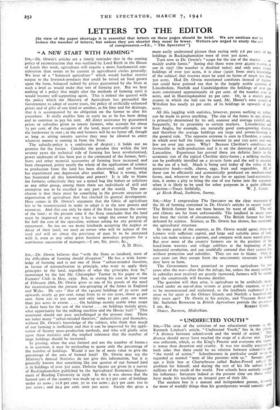LETTERS TO THE EDITOR
[In view of the paper shortage it is essential that letters on these pages should be brief. We are anxious not to reduce the number of letters, but unless they are shorter they must be fewer. Writers are urged to study the art of compression.—Ed., "The Spectator "]
"A NEW START WITH FARMING"
Orwin's articles are a timely reminder that in the coming policy of reconstruction that was outlined by Lord Reith in the House of Lords this week, agriculture will require a more fundamental con- sideration than seems to be current in agricultural circles generally. We hear of a "balanced agriculture" which would further restrict output to the livestock-products that could be raised on food grown upon the farm, balanced indeed by prices guaranteed by the State at such a level as would make that sort of farming pay. But we hear nothing of a policy that might alter the methods of farming until it would become self-supporting again. This is indeed the quarrel with the policy which the Ministry of Agriculture has persuaded the Government to adopt of recent years, the policy of artificially enhanced prices and of gifts of one kind or another, as for lime and for drainage, that it is accompanied by no obligation on the farmer to alter his procedure. It really enables him to carry on as he-has been doing and to continue to pay his rent. All direct assistance by guaranteed prices or subsidies given to tenant farmers, who account for about 75 per cent, of the occupiers of the land, must eventually accrue to the landowner in rent ; in the end farmers will be no better off, though as long as sitting tenants survive they may be allowed to enjoy whatever money is coming in from the State.
The subsidy-policy is a confession of despair ; it holds out no promise for the future. Consider the paradox that within the last seventy years the technical side of farming has been revolutionised, power undreamt of has been put at the command of the fanner, ferti- lisers and other material accessories of farming have increased and been cheapened, pretty nearly the whole of the applications of science to production from the land has been discovered, and yet farming has experienced one depression after another. What is wrong, what has frustrated all this knowledge and power? It is idle to blame the farmers; collectively they are a mixed bag like bakers or solicitors or any other group, among them there are individuals of skill and enterprise not to be excelled in any part of the world. The con- clusion is that there must be something in the present structure or organisation of agriculture that has checked its general development. Here comes in Dr. Orwin's argument that the fabric of agriculture has to be reconstructed in order to adapt it to the new powers and resources. And this can only be done if the State becomes the owner of the land ; at the present time if the State concludes that the land must be improved in any way it has to tempt the owner by paying for half the cost of the operation, without asking for any promise of repayment. So too we see many landlords accepting the neglect or decay of their land; we need an owner who will be jealous of the land and will set about the provision of men fit to be entrusted with it, even as any other great business nowadays prepares for a continuous succession of managers.—I am, Sir, yours, &c., A. D. HALL.






























 Previous page
Previous page